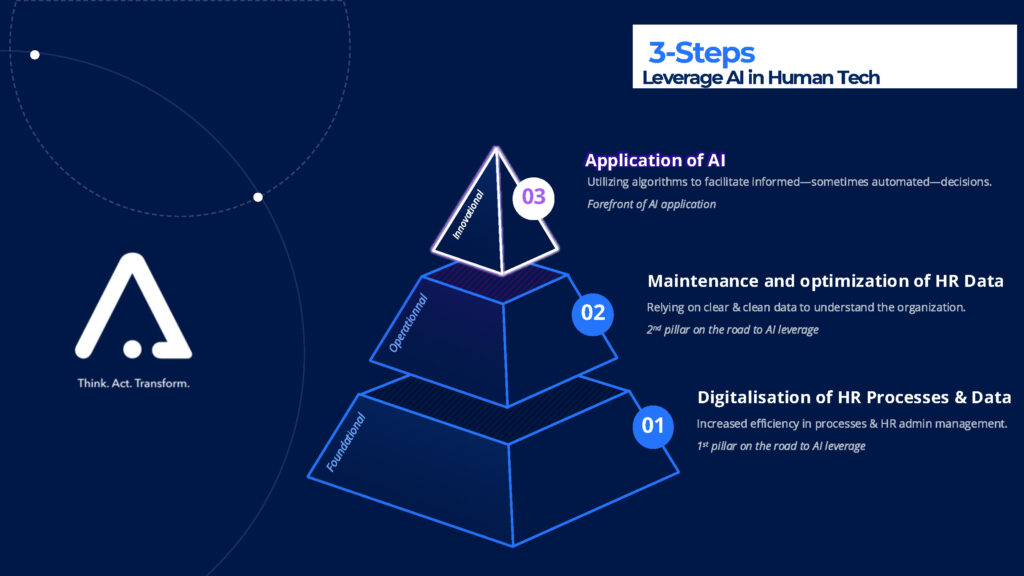AI is dominating conversations about the world of work, with bold promises about its potential to transform HR. The idea is seductive: automation, efficiency and optimized decision-making. Yet, while the enthusiasm is understandable, the reality is far more nuanced.
In many cases, AI in HR appears to be more of a buzzword than a genuine transformation lever, often denoting mere automation rather than real intelligence. For organizations just beginning their digital transformation, AI can seem a distant goal, overshadowed by more immediate needs: organizing personnel records, ensuring data quality and structuring robust digital processes.
The adage "garbage in, garbage out" takes on its full meaning here. AI can only produce relevant results if the elements it processes are of high quality. Before hoping to fully exploit its capabilities, companies must first build a reliable database by aligning their HR systems with long-term strategic objectives.
In a context where every modern company needs to rethink its work and harness the web to deliver an enriching experience to its customers, it is essential to integrate high-performance artificial intelligence. For the employer, whether large or small, the challenge is to transform automation into a genuine lever for innovation.
Employees benefit from optimized service, while recruitment is based on verified skills and rigorous data management. Ongoing training, supported by generative solutions and agile management, enhances the digital experience through interactive webinars and increased engagement. In addition, the digitization of processes helps to transform work and position the company as an innovative player in its market.
THE THREE PHASES OF HR DIGITAL TRANSFORMATION
AI represents the third phase in the digital evolution of HR - but it cannot function effectively without the foundations laid by the first two:
- Data digitization: convert HR information into structured, accessible formats for optimized storage and processing.
- Data reliability: check for accuracy, consistency and completeness, to ensure a solid, reliable foundation.
- Leveraging AI: using algorithms to generate insights, automate processes and support decision-making.

To meet these challenges, it is essential that companies equip themselves with high-performance tools and are equipped to effectively manage digital transformation. Digitization helps to structure day-to-day work, while meticulous data management and regular team upgrades ensure that artificial intelligence unfolds its full potential.
Advanced digital systems, combined with a clear strategy, enable the employer to improve the customer experience and enhance recruitment by valuing everyone's skills. Initiatives such as webinars and training workshops also help to better understand and integrate cutting-edge technologies into the company's day-to-day operations.
AUTOMATION: A DOUBLE-EDGED SWORD!
One of the most touted benefits of AI is process automation. Recurring HR tasks, such as payroll management, scheduling or recruitment administration, can be simplified and optimized.
AI-based tools can detect errors, automatically update schedules and optimize resource allocation. Yet this automation also raises significant challenges:
- How can we ensure that managers remain involved in key decisions, rather than blindly validating automated recommendations?
- How many validation steps are really needed before automation becomes counter-productive?
- What happens if a key decision-maker is unavailable?
AI can reduce the risk of human error, but only if organizations design processes that strike the right balance between technological efficiency and human supervision. It should be used as a decision-making aid, without replacing the critical judgment essential to HR operations.
So, by integrating intelligent automation tools, the company can improve its service while maintaining team involvement. In an environment marked by telecommuting and increased market competition, it is essential for managers to remain attentive to the specificities of each situation, whether in terms of data management, recruitment or training. This approach also makes it possible to anticipate industry trends and adjust the overall strategy to meet current and future requirements.
FASTER DECISION-MAKING: AT WHAT PRICE?
Predictive analytics and AI can speed up HR decision-making, identifying recruitment trends, forecasting departures and optimizing talent management. However, for these decisions to be informed, several conditions must be met:
- A well-structured HRIS, capable of collecting the right information without burdening candidates and employees with cumbersome processes.
- Performance indicators based on objective, unbiased criteria.
- Continuous updating of skills repositories to ensure their relevance.
While predictive analysis is powerful, it relies on accurate data. Without rigorous maintenance of this information, recommendations can be misleading, reinforce certain biases or offer limited added value. To meet this challenge, it is important for every organization to have a solid strategy that integrates both in-depth research and the use of modern tools.
PERSONALIZATION: REAL OR SUPERFICIAL?
AI promises an ultra-personalized employee experience, with tailored training paths and individualized career development plans. However, for this personalization to be truly effective, it is imperative that employees are viewed as unique individuals, and not simply as information aggregated by an algorithm.
AI-based recommendations must answer key questions:
- Does the system collect and update the right data exhaustively?
- Who is responsible for continuously checking the accuracy of information?
- How can we ensure that AI doesn't reproduce existing biases instead of fostering genuine growth opportunities?
HR teams need to invest time and resources to guarantee data quality and fully exploit the potential of personalization. This requires a combination of training, strategic information management and regular monitoring of labor market trends.
A well thought-out personalized approach is based on close collaboration between artificial intelligence and HR teams. By integrating generative solutions into the recruitment process, we can identify new talent and offer career paths tailored to each individual's skills.
By valuing both individual and collective experience, organizations can offer a service that meets the expectations of both internal and external customers, while ensuring continuous evolution in a fast-changing sector.
AI REMAINS A TOOL, NOT A SUBSTITUTE FOR HR EXPERTISE
AI has the potential to transform HR, but it should never replace HR professionals. Rather, it should enable them to access better analytics and gain greater efficiency.
The success of AI in HR rests on three essential pillars:
- Data quality: clean, structured and regularly updated information.
- Strategic alignment: AI insights must serve long-term HR and business objectives.
- Human supervision: AI must complement the know-how of teams, without replacing their judgment.
HR experts play a central role in guaranteeing data accuracy, limiting risks and ensuring that technology meets the organization's concrete needs. By adopting an approach that combines research and continuous training, they optimize processes while maintaining human management of digital transformation.
TO GO FURTHER... AND BUILD THE RIGHT FOUNDATIONS
The potential of AI in HR is real, but taking advantage of it requires more than enthusiasm. We need to invest in data quality, optimize digital processes and ensure that AI enriches HR strategy without dictating it, even in times of crisis.
- Assess information maturity - Are your HR files sufficiently structured and reliable?
- Prioritizing reasoned automation - In what areas can AI really improve efficiency without compromising supervision?
- Adopt an evolutionary approach - Artificial intelligence is advancing, as are HR strategy requirements.
AI isn't a silver bullet, but with a solid foundation, it can become a powerful asset for innovative HR teams. Are you ready to harness its full potential?
Discover ACT-ON HRIS & ACT-ON DATA. Have a project in mind? Get in touch with us.





